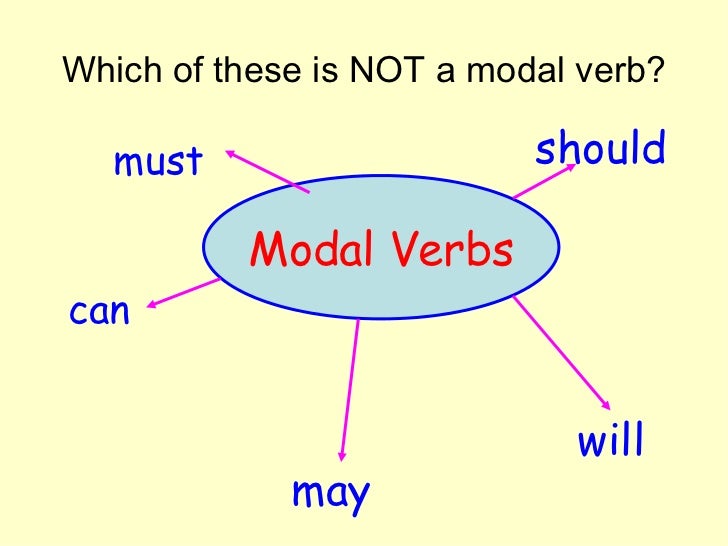What Is Modal Verbs / Modal Verbs - ( do, be and have ) 2.
What Is Modal Verbs / Modal Verbs - ( do, be and have ) 2.. I have chosen not to. Modality is about a speaker's or a writer's attitude towards the world. The car wouldn't start this morning the car didn't start this. Modal verbs are a type of auxiliary verbs that expresses necessity, ability or possibility. Grammar > verbs > modal verbs and modality.
Modal verbs are sometimes referred to as modal auxiliary verbs because they help other verbs. I could pay my fees. Modal verbs always accompany the base (infinitive) form of another verb having semantic content. A modal is a type of auxiliary (helping) verb that is used to express: They are different from normal verbs like work, play, visit. they give additional information about the function of the main verb that follows it.

However, modal phrases are used in the sentences to express the same things.
The modal verb must be used in a verb. Most people will see the word verb and think doing words because verbs are simply action words that show something happening in some way. What is a modal verb in english? A speaker or writer can express certainty, possibility, willingness, obligation, necessity and ability by using modal words and expressions. Can/can't + base form of the verb. Shall is a good modal verb to recognize, but it's rarely used in everyday language because it feels so formal and polite to native english speakers. A modal verb might also be referred to as a 'helping' verb and these are very common within the english language. Modal verbs are sometimes referred to as modal auxiliary verbs because they help other verbs. Learn about the usage of modal verbs and their alternative forms in english grammar with lingolia's online lesson. An auxiliary verb, also called a helping verb, helps other verbs show moods and tenses. I have chosen not to. Modal verbs meaning…modal auxiliary… a modal verb is a helping (auxiliary) verb that expresses ability, possibility, permission, or obligation. I could pay my fees.
Modal verbs meaning…modal auxiliary… a modal verb is a helping (auxiliary) verb that expresses ability, possibility, permission, or obligation. These are verbs that indicate likelihood, ability, permission or obligation. Modals (also called modal verbs, modal auxiliary verbs, modal auxiliaries) are special verbs that behave irregularly in english. Modal verbs are auxiliary verbs which are used in the sentences to refer possibility, ability, advice, permission, obligation and others. They are auxiliary verbs that provide additional and specific meaning to the main verb of the sentence.

They are auxiliary verbs that provide additional and specific meaning to the main verb of the sentence.
Learn about the usage of modal verbs and their alternative forms in english grammar with lingolia's online lesson. Grammar > verbs > modal verbs and modality. However, perhaps the best way to think of modal verbs is as verbs that modify the meaning of the main verb. In english , the modal verbs commonly used are can, could, may, might, must, will, would. 'could' is a modal verb that indicates the ability is there to complete an action. They are auxiliary verbs that provide additional and specific meaning to the main verb of the sentence. Modal verbs are sometimes referred to as modal auxiliary verbs because they help other verbs. The modal verb must be used in a verb. A modal verb might also be referred to as a 'helping' verb and these are very common within the english language. This is a powerful verb and is often used to imply a problem. Can/could, may/might, will/would, shall/should and must. Ability, possibility, permission or obligation. However, the implication is offered that there is a reason for not having done what is required.
A modal verb might also be referred to as a 'helping' verb and these are very common within the english language. These are verbs that indicate likelihood, ability, permission or obligation. Modal verbs are sometimes referred to as modal auxiliary verbs because they help other verbs. Modals (also called modal verbs, modal auxiliary verbs, modal auxiliaries) are special verbs that behave irregularly in english. What the deference between these sentences:

Modal verbs there are three classes of verbs in english 1.
In english , the modal verbs commonly used are can, could, may, might, must, will, would. Tom can write poetry very well. We outline the modal verbs english with examples and explanations. (must, can modal verbs always accompany the base (infinitive) forms. Modal verbs there are three classes of verbs in english 1. In this article, we are going to discuss what modal verbs are and their modal verbs can be used to express ability, possibility, permission or obligation. This is a powerful verb and is often used to imply a problem. Modality is about a speaker's or a writer's attitude towards the world. Likelihood, ability, permission, request, capacity, suggestions, order, obligation, or advice. Grammar > verbs > modal verbs and modality. The modal verbs of english are a small class of auxiliary verbs used mostly to express modality (properties such as possibility, obligation, etc.). I have chosen not to. What is a modal verb?
Komentar
Posting Komentar